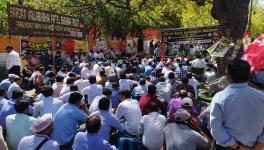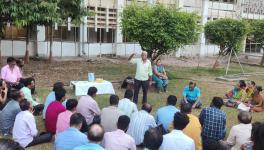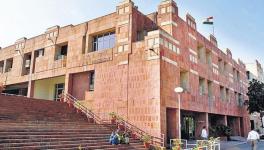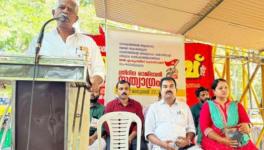Terminated ITI Workers Unable to Withdraw Provident Fund
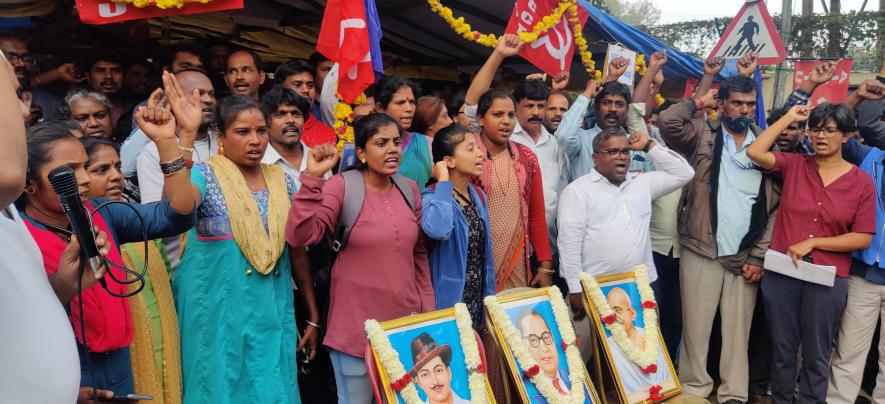
The terminated contractual employees of Indian Telephone Industries (ITI) Limited, Bengaluru, in July were shocked to discover that they were unable to withdraw money from their Provident Fund (PF) accounts. Vanitha Udyoga Sahakara Sangha (VUSS), the contractor who hired them, had deducted the PF amounts from their salaries but did not deposit them into their accounts. VUSS was later replaced by a new contractor.
One year ago, more than 100 contractual employees of ITI, a public sector company which manufactures communications equipment, were laid off without notice and their entry was barred on December 1, 2021. The employees believe that they were terminated due to their decision to form a trade union and demand permanent employment.
The sacked employees started a sit-in protest at the gates of the company and 80 protestors have been continuing the fight for reinstatement and payment of arrears.
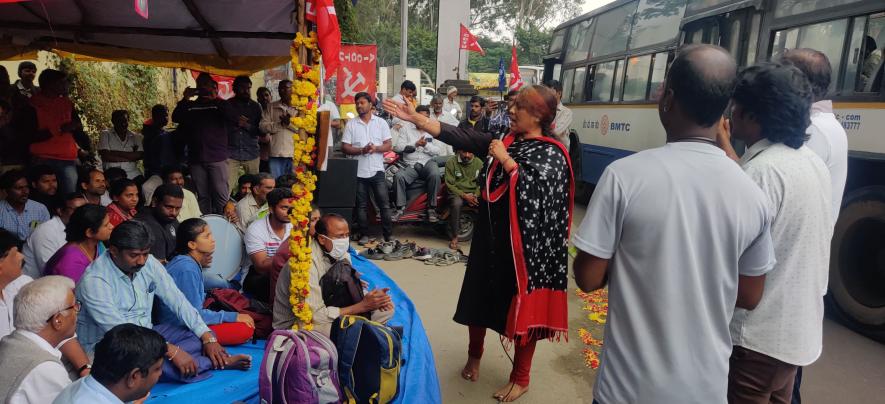
Arun (34), who joined the defence assembly department in 2010, was responsible for assembling telephones which would later find their way to remote forests across the country.
“VUSS did not deposit the PF payments from December 2019 to June 2020. In July 2020, VUSS was replaced by another contractor called Poojyaya Security and Manpower Services Private Limited, which deposited the deducted PF amounts into our accounts on time. But it was replaced as well on December 1, 2021,” Arun tells Newsclick.
“At the same time, more than 100 contractual employees were selectively terminated. When I approached the PF office to withdraw my funds, it mentioned the seven-month [December 2019-June 2020] gap. I was told that unless that money is credited, I cannot withdraw from my PF account,” Arun adds.
On December 1 (Thursday), the protestors marked one year of their resistance. They were joined by students, union members and activists from various organisations like Dalita Sangarsha Samiti (Ambedkar Vada), CITU and Gamana women’s collective. Around 100 people occupied the protest tent amid songs of resistance and speeches made in solidarity with the terminated employees.
The employees have also pasted a statement made by Railways and IT minister Ashwini Vaishnaw at the protest site. The statement was a reply to Rajya Sabha member L Hanumanthaiah, who had written to the minister urging him to look into the arbitrary sacking of the ITI workers.
In his reply, Vaishnaw wrote that the issue had been “re-examined on the advice of Dy. chief labour commissioner, Bengaluru” and assured the MP that “the protesting workers were advised to register with the new contractor for deployment. [The] deployment will happen in a phased manner thereafter”.
Deputy chief labour commissioner orders reinstatement
On March 17, ITI representatives and the Karnataka General Labour Union (affiliated to AICCTU) held a bilateral discussion in the presence of the deputy chief labour commissioner in Bengaluru. Subsequently, the commissioner directed ITI to reinstate 35 sacked employees and ensure that the other 45 employees were also reinstated at the earliest.
ITI representatives Sajan Abraham (HR, Bengaluru plant) and Narasing Raj (chief manager, legal) agreed to obey the commissioner’s direction but the company failed to follow through with the agreement.
The sacked workers were informed that the ITI Employees Union, which represents the permanent employees, had objected to their reinstatement. The union was allegedly threatening a strike against the agreement. Soon, Abraham was transferred to another department.
On April 25, ITI challenged the commissioner’s order in the High Court of Karnataka three days before Vaishnaw’s written assurance to Hanumanthaiah.
Arbitrary pay scales
In 2010, Arun’s monthly salary was around Rs 5,000. Gradually, his salary was increased to Rs 18,000 but arbitrarily scaled back to Rs 13,000 with the company citing his qualifications. After passing high school, he completed a job-oriented course in electronics. Arun says he has never come across an instance where an individual’s salary is reduced without any negative performance review.
Gangaraj (27), who has an engineering degree, was hired as a contractual employee by Mahila Udyoga Sahakara Sangha (MUSS) for the R&D department at a salary of Rs 18,000 in 2018.
The protestors alleged that both VUSS and MUSS are operated by the same people. Gangaraj travelled from Kolar to Bengaluru for two hours daily one way to save money. “When the lockdown was imposed, I was in Kolar. I was stuck there for two months with no buses plying to Bengaluru. I wasn’t paid during that duration,” he says.
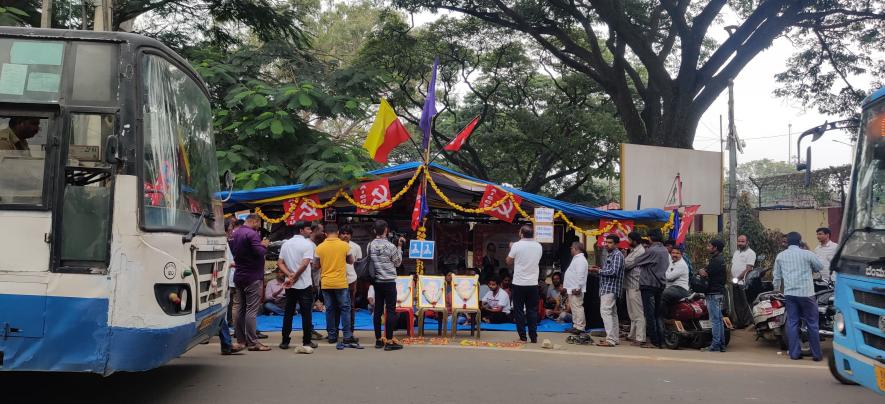
“In June, I started working on the production of face shields. For two months, April and May, neither my salary nor my PF contribution were credited to my account. MUSS said that the management had not paid the money for that period. When I tried to withdraw from my PF fund, my request was denied,” he adds.
Gangaraj filed a complaint with the PF office but received a cryptic reply: “As the member stated, the matter is under prejudice and shall be dealt with subject to the outcome of the case.”
A confused Gangaraj filed a right-to-information request for clarification on which ‘case’ was being referred to by the PF office. However, the response he received was that grievances with regard to the payment of PF contributions have to be addressed to the appropriate forum.
Prasanna, the new head of HR, Bengaluru plant, refused to elaborate on the matter. “The matter is in the court. We will follow the decision of the court,” he tells Newsclick.
The next date of the hearing is December 6. The union workers believe that they are being punished and are up against a faceless system.
Get the latest reports & analysis with people's perspective on Protests, movements & deep analytical videos, discussions of the current affairs in your Telegram app. Subscribe to NewsClick's Telegram channel & get Real-Time updates on stories, as they get published on our website.










